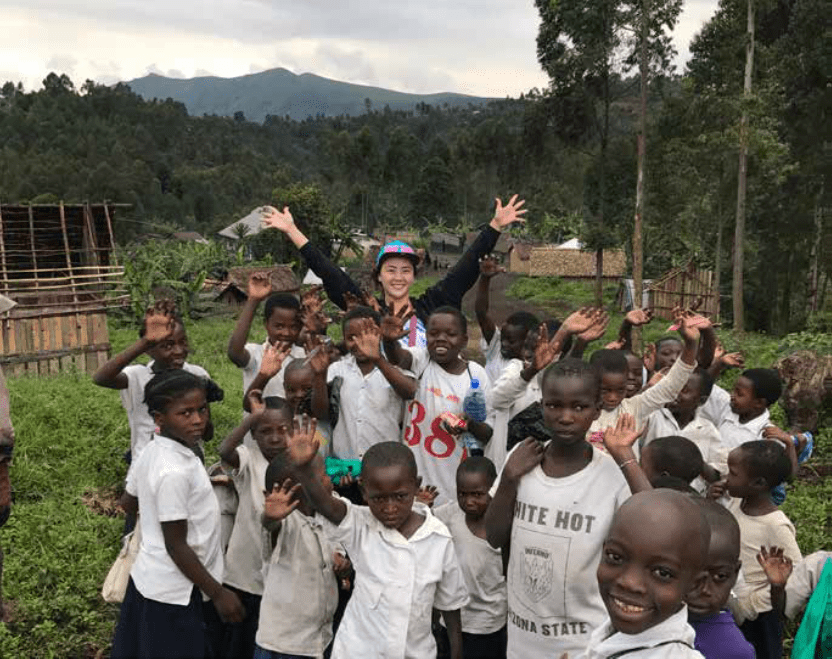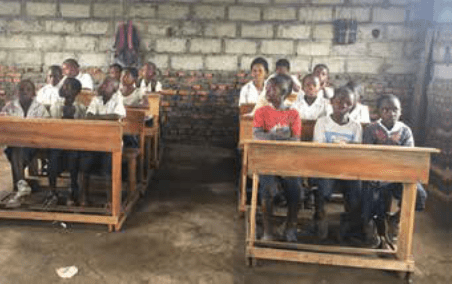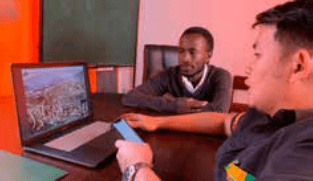Stories > To Africa, With Love
To Africa, With Love
Building schools and shelters for abandoned children in Africa has given one Singaporean couple unforgettable life lessons.
BY SHWETA PARIDA

Singaporean Lam Bao Yan started her volunteer journey in Africa in 2013, where despite facing many life-threatening situations, she has found purpose in helping and teaching marginalised children while gaining a new life perspective.
hen Singaporean architect Rudy Taslim, disentranced with his high-flying career, began to look for answers to fill an unidentifiable void in his life, he found them far away from his comfortable life in Singapore – in a remote village in Africa. Taking a leap of faith, he bought a one-way ticket to Mozambique in 2014, and with the help of international non-profit Iris Ministries, embarked on a four-month-long volunteer journey there.
“I had reached a point where I questioned my contribution to society,” he reflects. “Naturally, as an architect, I gravitated towards the idea of building for marginalised communities.”
Taslim’s connection to the continent started when his wife and entrepreneur, Lam Bao Yan, volunteered a year earlier in Rwanda, Mozambique and the Democratic Republic of Congo (DRC), where she got involved in rescuing and housing abandoned children.
Still, Taslim – who studied architecture in Singapore and Australia – did not dive into building activities immediately upon his arrival. To gain a true sense of what it meant for the poor and marginalised, he lived with them in a modest accommodation.
“It is misplaced confidence to think that coming from a developed country, we can simply walk into another country with fewer resources and change their lives because we have all the solutions,” he explains.
A NEW AWAKENING
On their initial trips, the couple invested time in getting to know the place, understanding local culture and developing friendships. Lam recounts an incident that took place while she was volunteering at a school for orphaned and abandoned children in Mozambique. While conducting an outdoor activity, she noticed that the two 10-year-old boys by her side were wearing only one slipper each. She proceeded to tell them how to wear shoes properly. The boys kept smiling and nodding their heads.
“IT IS MISPLACED CONFIDENCE TO THINK THAT COMING FROM A DEVELOPED COUNTRY, WE CAN SIMPLY WALK INTO ANOTHER COUNTRY WITH FEWER RESOURCES AND CHANGE THEIR LIVES BECAUSE WE HAVE ALL THE SOLUTIONS,” SAYS RUDY TASLIM.

Many young boys in the strife-torn regions of the Democratic Republic of Congo and Mozambique, who have been made to work as child soldiers by local militia groups, find hope for the future in the safe shelters and schools run by non-profits that Rudy Taslim and Lam volunteer with.
“It was only then that I realised they were wearing the different sides of the same pair – one wore the left and the other the right – because that was the only pair they had between them,” she says. “I was speechless at my own ignorance. Those children demonstrated how little I knew about life.”
The husband and wife duo are acutely aware of the fact that if things ever get overwhelming, they always have the option of flying back home. But the natives have no such recourse. Recognising their privilege also meant forgoing familiar comforts during their travels to Africa, which they took up to three times a year before Covid-19 struck. The lack of broadband network and Wi-Fi, considered necessities in developed countries, resulted in long spells when they could not contact their families back home.
“Over there, we eat whatever our hosts offer us, and hot showers can be a rare occurrence,” says Lam, adding that in the remote and rough terrains, mashed cassava with a tangy gravy could be all that was available for days on end. But the locals would occasionally treat the couple to rice and beans – a luxury by their standards, and a testament to their generosity.
SWAPPING GUNS FOR EDUCATION
While summing up their experiences as a real paradigm shift, the couple also admit that nothing could have prepared them for the hardscrabble life of the people they were hoping to help. Years of domestic conflict – like the Rwandan genocide and rebel militia uprisings in Mozambique and the DRC – had resulted in such practices as young girls being sold as child brides to much older men due to abject poverty, as well as underaged boys forced to become child soldiers and trained to kill without emotion.
Among the many observations she had made from her time as a volunteer, Lam says there was one that particularly bothered her until she figured out the cause. “The rescued children always seemed angry when they were first taken to the shelter,” she recalls. “They would not smile at you even if you tried to be friendly. But after a couple of days, they would begin to warm up to you. I realised then that their indignant behaviour was due to hunger.”
Another classroom incident with a rescued child soldier in the DRC left her somewhat shaken, but also full of hope. The young boy still in militia garb suddenly pulled out a gun and refused to put it away. Fearing for the safety of other children and her own, she offered him a football on a hunch to distract him. “Immediately he put down his gun and started playing with the football,” she narrates. “It wasn’t rocket science – all it took was a football.” Since then, she carries a bunch of deflated footballs and other small presents with her.

Through his architecture firm Genesis Architects, Taslim shares his expertise with the local volunteers to help them build schools for abandoned children in Rwanda.
Believing that the only way to pull these children out of despondency is to put them in schools and give them hope for a better future – not to mention shelter and daily meals – Taslim and Lam decided to empower them through education. The former had set up his own firm, Genesis Architects, shortly before his maiden Africa trip to contribute his expertise to pro bono projects, alongside commercial jobs. Having gained experience designing schools for Singapore’s Ministry of Education, he decided to adapt his prior knowledge to suit the local requirements.
“As an architect, I am interested in bringing back dignity and delight to their spaces so that they can take ownership of their school. Transfer of knowledge to the locals is a crucial step in this process,” he explains.
“Having worked with Rudy and Bao Yan, who have demonstrated how to lead with humility and commitment, I can appreciate the admirable spirit of Singaporeans in the way they engage with African people.”
John Rucyhana, Minister of Unity and Reconciliation, Rwanda
“While cost remains an important factor in such projects, we do not want to build them just another shack. Hence, we developed a robust prototype that can be installed anywhere – by the riverside or mountaintop with vastly different foundations.”
A BRIGHTER FUTURE
One particular school project that is close to the duo’s hearts is the institution for abandoned, visually impaired children in Rwanda, East Africa. Introduced by diplomats at the Embassy of Rwanda in Singapore who came to know about the couple’s work, Lam decided to make a trip to the country. “These children have been abandoned by their families because, according to a local superstition, blind children are a curse to those around them,” she shares. “In fact, many of them weren’t born without eyesight but lost it due to the lack of timely medical intervention.”
Despite the trauma these children – aged four to nine years old – have experienced, they began to feel alive in the safe school-run shelter. The project that started out with 50 children is now home to 120, and works are ongoing to expand it further to accommodate 300.
Lam is already thinking about the future of these children once they graduate from high school: “We are currently working on a project that will train the visually impaired children to run their own bakery so that they can be financially independent.”
While Rwanda is popularly known as the Land of a Thousand Hills, the locals prefer its other moniker: Singapore of Africa. “Rwandans who are still haunted by the memories of the 1994 genocide are now in nation-building mode,” shares Lam. “They feel inspired by Singapore as they believe that if we can achieve so much progress through hard work, so can they. It’s very heartening to see their industriousness.”
John Rucyhana, who is Rwanda’s Minister of Unity and Reconciliation, helps to facilitate many initiatives run by local nonprofit Transformational Ministries in Africa, and appreciates the duo’s humanitarian work. “Earlier, I used to only know of Singapore as a small nation that was also a developing country like us. Having worked with Rudy and Bao Yan, who have demonstrated how to lead with humility and commitment, I can appreciate the admirable spirit of Singaporeans in the way they engage with African people,” he says.
The couple now views life from a whole new perspective. “Every time I come back from Africa, I feel the more I know, the more I don’t know,” Taslim contemplates. Lam echoes his sentiments. “No problem seems big enough after working with the tenacious children in Africa. Our problems here, such as train breakdowns and Covid-19 lockdowns, feel like complete non-issues in comparison,” they conclude.
